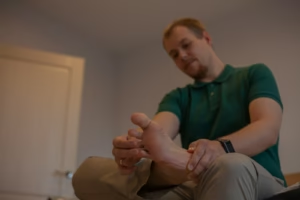When Your Baby’s Sleep Takes a Step Backward
Research from the American Academy of Pediatrics shows 85% of babies experience at least one big sleep disruption in their first year.
Around 6 months, many parents notice something weird: their sleeping babies start waking up a lot. Sometimes multiple times a night. This is what we call the 6 month sleep regression.
If you’re experiencing sleepless nights and wondering what’s going on, you’re not alone.
Knowing 6 month sleep regression signs will help you respond. It will help your baby’s development and your own sanity during this crazy phase.
This guide will explain what happens during this stage. We’ll show you how to spot the warning signs. And we’ll give you practical tips to help your family get through this transition.
Whether you’re a new parent or a seasoned pro, knowing what to expect makes all the difference.
What Is a Six-Month Sleep Regression?
A sleep regression is when a baby who was sleeping well suddenly starts having disrupted sleep.
At 6 months this coincides with major developmental leaps. Your baby’s brain is reorganising itself. Their sleep cycles are maturing. Their nervous system is getting more complex.
Think of it like this: Learning to drive while someone keeps moving the road around you.
Your baby’s brain is processing big changes. Their body needs more energy for this growth. Their new awareness means they’re noticing the world – and your absence – more than before.
Plus growth spurts often happen at this age. Your little one may actually need more feeding and cuddling.
This isn’t a setback. It’s actually a sign of healthy development happening behind the scenes.
Identifying 6 Month Sleep Regression Signs
Recognizing the signs early on is usually what helps you tell a sleep regression apart from any other issues like whether your baby is genuinely unwell or simply not very comfortable.
Heres what you can typically expect to see during this phase:
Common signs of six-month sleep regression are:
- Frequent night time wake-ups – some babies wake up for a feed every hour or more, even though theyve been sleeping through the night up till now
- Trouble getting to sleep – some babies struggle to wind down at night, even when they look like theyve got the sleepiness thing down pat
- Shorter naps during the day – or frankly, just not wanting to have a nap at all
- A bit more of a cranky baby – babies often get a bit testy when you try to put them down in their crib
- They become really clingy – refusing to be held by anyone other than you, or getting upset when you have to go do something else for a second
- All new fascinated with the surroundings – your baby might suddenly become completely absorbed in their own hands and toes, even when theyre trying to sleep
How long does it last for?
Most sleep regressions are done and dusted within 2 to 4 weeks. But some babies can take a bit longer to adjust – and if your baby is still waking all over the shop after 6 weeks or more, its probably a good idea to have a word with your doctor. And similarly, if your baby is showing signs of being off colour, or running a fever, or just not feeling right – get some professional advice.
Support Strategies and Comfort Solutions
Sleep regressions might be temporary but they come with a whole lot of real and exhausting consequences.
Here are some evidence based tips to help both you and your baby get through this phase
Effective ways to tackle sleep regression:
- Stick to a consistent bedtime routine , even on the nights that feel like a disaster – having some sense of predictability can really help soothe that developing nervous system
- Feed your baby more often during the day – this way you can make sure they’re not waking up because they’re hungry at night
- Get your baby moving around while they’re awake – we know, it can be a pain, but it’s great for their development
- Set up a sleeping space that’s super calm – think dim lighting, comfy temperature and maybe some white noise in the background. It all helps
- Be ready to jump up at a moment’s notice to feed or soothe your baby – this can actually help them learn to self-soothe faster
- If you need to , consider co-sleeping or room-sharing for now – its not ideal for everyone but if it helps you all get some rest then that’s a bonus.
Movement really is key to getting better sleep.
Lots of parents find that getting their baby moving during the day helps them sleep better at night. Your baby needs to stretch and move their muscles to get tired naturally.
We mean simple things like stretching or just sitting up with support. Even just throwing a blanket on the floor and letting them crawl around a bit.
All that movement is great for their development and will also help them sleep better. If you’re worried about how to do it right or if your baby is a bit too small to be doing all that stuff then do get in touch with our physio team.
What Research Tells Us About Infant Sleep Development
Recent studies put out by a team of pediatric sleep experts have made it clear that sleep regressions tend to occur at specific times, and those times are right in line with some major brain development milestones.
At 6 months old, babies’ sleep patterns undergo a pretty dramatic shift. Their REM and non-REM cycles – the deeper and lighter phases of sleep – get more refined, and their brains actually kick into high gear while they’re asleep.
So, why is this so important?
It’s because this major brain shift is a key part of how our kids start to grow cognitively – but in the short term, it also really messes with their established sleep routine.
Developmental psychologists have found another thing to add to the mix: around 6 months, babies start getting a lot more anxious as they work out what’s going on. This ‘object permanence’ business – where they figure out that when you leave the room, you are still you, even if you’re out of sight – is a pretty big deal.
The thing is, it also makes them get a bit worried about whether you’ll actually come back. So there’s that.
Combine this with the fact that they’re suddenly getting all confident in their new motor skills – and are now rolling and sitting up – and you have a perfect storm of sleep problems.
And the good news is… it doesn’t last. Within weeks, their nervous system starts to adapt, and sleep tends to go back to being a lot more normal. Understanding that helps parents keep things in perspective on those tough nights when it feels like nothing’s going right.
Building Healthy Sleep Habits for the Long Term
Prevention is always a heck of a lot easier than trying to fix the problem when it’s already here.
Getting your baby on a strong sleep routine right from the start sets them up for way better sleep patterns as they get older.
Here are some real world tips:
Start getting your baby into a routine as early as possible, and stick to it. I mean, even a six month old can benefit from knowing when to be awake and when to sleep – and that helps their internal clock get going in the right direction.
Create a calm pre-bedtime routine that’s just for your baby. Dim the lights, turn off any distracting toys or games, and get your baby used to a gentle routine that they can bank on.
Let your baby develop their skills at their own pace and give them space to get stronger safely. As your baby learns new things, put them in situations where they can practice without you hovering – like tummy time, play time on a mat, or just having some gentle fun. It’ll wear them out just enough for a good night’s sleep.
And don’t forget about your own welfare – we don’t always think about this stuff but trust me, fatigue is real and it affects everything. Take a break when you’re feeling it. If you’ve got a partner to share the load with – even just for overnight shifts – then take it. And remember that this phase of getting your baby to sleep is going to end, so just hang in there.
Your own mental health is going to be key in soothing your baby when they’re feeling upset.
Last but not least, keep the lines of communication open with your healthcare professional – every baby is different after all. What works for one family might need to be tweaked for another – and that’s just the way the cookie crumbles.
Moving Forward Together
6 month sleep regression signs – knowing them inside out lets you head into this challenging time feeling a lot more confident and a whole lot less anxious.
Your baby’s disrupted sleep isn’t your fault – it’s just a sign that they’re reaching some pretty incredible milestones. Big developments are happening right now, and the fact that they’re not sleeping through the night is part of that.
Being armed with some basic knowledge about what’s normal, some realistic ideas about what to expect, and a few practical strategies to try can make all the difference here. With this kind of backup, you can support your little one through this tough patch and also make sure you keep yourself feeling rested and sane.
Here’s a reality check: this phase is just that – a phase – and it will come to an end. In fact, most babies end up sleeping slightly better than before it all started, having picked up some new skills and having a more mature nervous system to boot.
Hang in there – it’s worth being patient and sticking to what you know works. Trust the process and know that your baby is doing just fine.
If you’re worried about your baby’s development or would like help figuring out how to use movement and positioning to help them sleep better get in touch. We’d love to help.
Got a baby who’s sleep is suddenly a bit all over the place? Want some evidence-based advice on how to get through this phase with your sanity intact? Our homepage is a great place to start looking for tips, advice and resources on infant development and getting your family fit and well.
References
- American Academy of Pediatrics (AAP). Healthy Sleep Habits, Happy Child. https://www.healthychildren.org/
- National Institute of Child Health and Human Development (NICHD). Safe Sleep for Babies. https://www.nichd.nih.gov/
- Mindell, J. A., & Williamson, A. A. (2018). Benefits of a bedtime routine in young children: Sleep, development, and beyond. Sleep Medicine Reviews, 40, 93-108. https://pubmed.ncbi.nlm.nih.gov/29724498/
- Sleep Foundation. Infant Sleep Development and Regressions. https://www.sleepfoundation.org/
- Gee, D. G., & Casey, B. J. (2019). The impact of developmental timing for stress and recovery. Neurobiology of Stress, 10, 100141. https://pubmed.ncbi.nlm.nih.gov/31193454/














